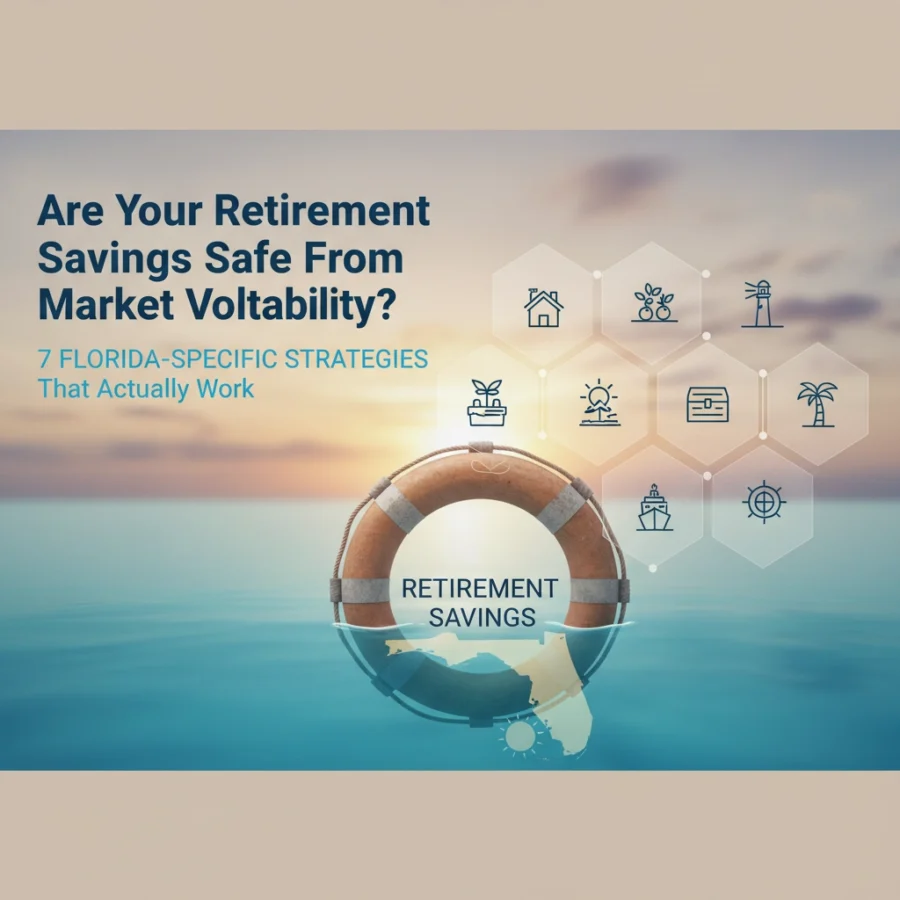Market volatility can feel like a roller coaster, especially when your retirement security is on the line. If you're planning for retirement in Florida or already retired here, you have unique advantages that many other states don't offer. The key is knowing how to leverage these benefits while implementing proven strategies that protect your wealth during turbulent times.
As a fiduciary financial advisor in Stuart FL, I've helped countless clients navigate market uncertainty by building resilient portfolios that weather storms and thrive over time. Let's explore seven Florida-specific strategies that can safeguard your retirement savings, no matter what the markets throw your way.
Strategy 1: Maximize Florida's Tax-Free Status for Strategic Withdrawals
Florida's lack of state income tax creates a powerful advantage for retirement income planning that many retirees overlook. Unlike residents of high-tax states who lose significant portions of their withdrawals to state taxes, you keep every dollar you withdraw from your retirement accounts (minus federal taxes, of course).
This advantage allows for sophisticated withdrawal strategies that minimize your overall tax burden. Rather than taking equal amounts from all account types, consider a tax-efficient approach: withdraw from taxable accounts first during your early retirement years, then supplement with traditional IRA distributions as needed. This strategy keeps your federal taxable income lower, potentially maintaining you in a reduced tax bracket during volatile market periods.
Florida's favorable tax environment also makes it an ideal location for Roth IRA conversions. Converting traditional IRA funds to a Roth during lower-income years or market downturns costs less in taxes and provides tax-free growth protection against future market uncertainty. This comprehensive wealth management approach can significantly impact your long-term financial security.

Strategy 2: Build an Impenetrable Cash Reserve
One of the most effective shields against market volatility is maintaining a robust emergency fund: typically three to six months' worth of living expenses in highly liquid accounts. This isn't just standard financial advice; it's your first line of defense against being forced to sell investments at the worst possible times.
Keep this emergency cushion in high-yield savings accounts or money market funds that offer both safety and modest returns. The separation between your essential expenses and your long-term investments is critical during market downturns. When your portfolio drops 20% or more, you can draw from your cash reserve to pay bills rather than crystallizing losses by selling investments, allowing your portfolio time to recover.
This strategy prevents the devastating cycle of panic selling during market lows: a mistake that can permanently damage your retirement security. Your cash reserve acts as a bridge during volatile periods, maintaining your lifestyle while your investments work through temporary market disruptions.
Strategy 3: Diversify with Florida's Real Estate Advantages
Smart diversification extends beyond the traditional stocks and bonds approach. Florida's robust real estate market offers unique opportunities for wealth preservation and growth, particularly in high-demand areas like Miami, Sarasota, and Jacksonville.
You don't need to become a landlord to benefit from Florida's real estate strength. Real Estate Investment Trusts (REITs) provide exposure to commercial and residential properties without the hassles of direct ownership. Many REITs focus specifically on Florida markets, allowing you to benefit from the state's population growth and tourism industry.
For those interested in direct real estate investment, Florida's favorable property laws and growing population create attractive opportunities for rental income and property appreciation. Municipal bonds are particularly suitable for Florida retirees since they're often tax-exempt at the federal level and align perfectly with the state's tax-favorable policies.
This holistic financial planning approach ensures your portfolio benefits from multiple asset classes, reducing your dependence on any single market sector.
Strategy 4: Implement Disciplined Annual Rebalancing
Markets don't move in perfect harmony, and over time your carefully planned asset allocation can drift significantly from your target. Schedule a comprehensive portfolio review at least once annually to assess your current allocation and rebalance as needed.
This disciplined approach prevents your portfolio from accidentally becoming too heavily weighted toward stocks during bull markets or too conservative during recovery periods. Rebalancing forces you to sell high-performing assets and buy underperforming ones: essentially buying low and selling high on a systematic basis.
During volatile periods, this strategy becomes even more valuable. When market fear drives prices down, rebalancing requires you to buy quality investments at discounted prices. This contrarian approach, while emotionally challenging, has historically rewarded patient investors with superior long-term returns.

Strategy 5: Create Guaranteed Income Foundations
Lifetime income funds and fixed annuities provide a "safety net" of guaranteed income that insulates part of your retirement from market volatility. These instruments create a stable baseline that covers your essential expenses regardless of market conditions.
Consider allocating a portion of your portfolio to fixed annuities that guarantee a specific annual income: for example, $30,000 annually for life. This foundation allows the remaining portions of your portfolio to stay invested for growth without the pressure to generate immediate returns during volatile periods.
Some lifetime income funds offer additional protection by periodically capturing your portfolio's highest value and basing future income payments on this amount. This feature protects you from market downturns that occur right before or shortly after retirement: historically the most damaging scenario for retirement portfolios.
This tax-efficient investing approach ensures you have reliable income while maintaining growth potential in other portions of your portfolio.
Strategy 6: Develop Multiple Income Streams
Having supplemental income sources beyond your primary retirement benefits acts as a financial buffer during volatile periods. This strategy reduces your dependence on investment returns and provides flexibility during market uncertainty.
Consider part-time work, consulting, or business ventures that provide ongoing income to offset potential investment losses. If you have sufficient alternative income, you can delay claiming Social Security until age 70, increasing your monthly benefits by approximately 8% per year and providing a larger inflation-adjusted income for life.
The podcast discussions at www.1715tcf.com frequently explore creative income strategies for retirees, including ways to monetize skills and expertise developed during your career. These additional income streams create cushions that make market volatility less threatening to your overall financial security.
Strategy 7: Implement Strategic Estate and Healthcare Planning
Market volatility becomes less concerning when you've reduced your financial obligations through strategic planning. This portfolio management approach extends beyond investments to encompass your entire financial picture.
Purchase long-term care insurance to cover potential healthcare costs, ensuring that unexpected medical expenses don't force you to liquidate investments during market downturns. Establish a revocable living trust to hold your Florida real estate, bypassing probate and simplifying wealth transfer while protecting assets from market-driven forced sales.
Consider donor-advised funds for charitable giving, which reduce your current taxable income while supporting causes important to you. These estate planning tools protect your wealth from unnecessary taxation and legal complications that could force unfavorable investment decisions during volatile periods.

Putting Your Strategy Into Action
The most resilient retirement plans combine these strategies into a cohesive whole. You might maintain a six-month cash cushion, allocate investments across stocks, bonds, and real estate, ensure guaranteed income covers essential expenses, and plan strategically for taxes and healthcare costs.
This layered approach means market downturns create temporary portfolio fluctuations rather than retirement crises. By combining Florida's unique advantages with proven risk management strategies, you create a retirement that remains stable regardless of market conditions.
Remember, successful retirement planning isn't about predicting market movements: it's about building a structure strong enough that market movements don't derail your plans. As your fiduciary financial advisor, the goal is creating comprehensive wealth management strategies that protect and grow your assets through all market cycles.
If you're ready to implement these strategies or want to discuss how they apply to your specific situation, consider scheduling a consultation to review your current approach and identify opportunities for improvement. Your retirement security depends on taking action today, not waiting for the perfect market conditions that may never come.



Leave a Reply